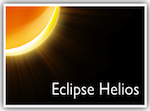
Eclipse Galileo
Eclipse – це модульне інтегроване середовище розробки програмного забезпечення (IDE). Воно є найпопулярнішим серед Java, C++, PHP, JavaScript, Python розробників. Сьогодні ми поговоримо про IDE для WEB- програміста, а якщо конкртеніше, то про взаємодію: Eclipse + PDT + Smarty + Python. Я у свій час “пройшов” через багато редакторів: починаючи від простеньких, що лиш підсвічують синтаксис, і закінчуючи такими “монстрами” як: Eclipse, Zend Studio та NetBeans. З останнім я кілька днів попрацював і чомусь розчарувався, уже точно не пам’ятаю чому. А з Zend Studio “дружив” багато часу, починючи з тих часів, як він тільки почав розроблятися (це версії 2.x і тд.). Але з того часу як з’явився “плагін” для роботи із PHP у Eclipse (Eclipse 3.2 & PDT 0.7) – я назавжди попрощався з Zend Studio. Просто уже тоді було зрозуміло, що платити немає за що, так як Zend Studio якраз і базується на платформі Eclipse. І що саме важливе, що зазвичай для Zend Studio викорстовує старі релізи. А якщо порівнювати функціонал і кількість необхідних плагінів – то Zend Studio “курить в стороні” 🙂
Але менше з тим, мабуть, із заголовка Вас більше цікавило PDT + Smarty + Python? Так, так – це можливо! Але для цього прийдеться використовувати останні тестові збірки PDT та DLTK. Це все пов’язано із тим, що незабаром (23 червня 2010 року) має вийти новий реліз Eclipse Helios 3.6. Тому всі розробники уже проектують свої плагіни для сумісності із новими можливостями Helios. DLTK зараз працює над гілкою 2.x, PDT – над 2.2.x, а Smarty для PDT – взагалі майже ніхто не підтримує. Останні зміни були 25 листопада 2009 року, і саме на них чекали більшість шанувальників Eclipse+PDT, так як тепер SmartyPDT буде працювати із останніми тестовими збірками PDT 2.2.x. Тому, менше слів – за роботу! 🙂
Continue reading →
![]() PlatformIO is an open source environment for IoT development based on a cross-platform build system and a library manager. It’s simplifying continuous integration (including in the cloud!) of IoT systems and is well integrated with IDEs like Eclipse. It is compatible with Arduino, mbed, Energia, CMSIS, and much more.
PlatformIO is an open source environment for IoT development based on a cross-platform build system and a library manager. It’s simplifying continuous integration (including in the cloud!) of IoT systems and is well integrated with IDEs like Eclipse. It is compatible with Arduino, mbed, Energia, CMSIS, and much more.

